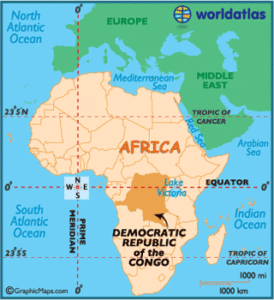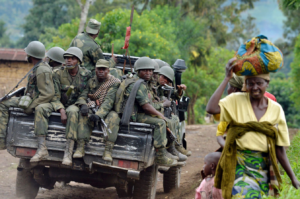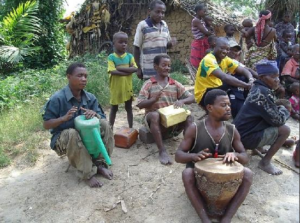Inspired by the LGBT movement in the West, small groups of gays are timidly trying to make a place for themselves in Democratic Republic of Congo
Inspired by the LGBT movement in the West, small groups of gays are timidly trying to make a place for themselves in Lubumbashi [the second largest city of the Democratic Republic of Congo]. But neither local customs nor Congolese law tolerate homosexual practices, which are considered abnormal…
François Musenge tells the story of the little mishap that happened to him in a nightclub in the center of Lubumbashi [a city of 1.5 million people at the far south of the country]. He says that he had gone out for a fun night with friends, and had one drink too many. When he went to the urinal, someone approached him to tell him that he pleased him. At first glance, Musenge thought it was a girl because he had earrings and braided hair. But Musenge quickly realized it was a man from his voice. He says he ran away to join his friends in the club and persuaded them to leave the bar…
In Lubumbashi, as in some other major Congolese cities, it is no longer rare to see homosexuals. They are slowly trying to come out of hiding, where they have lived for years because of the generally hostile views of the people. Some are now trying to claim what they consider their right. If we do not come out, how will others know that we exist and more importantly, how will we live?, asks Gaby, a 20 year old who attends a public house in the Golf neighborhood in the heart of Lubumbashi.
Hostile environment
Gaby is part of a group of five young gay men. Nightclubs and bars are often the only venues where they can meet and be seen. They go out at night to meet other people who see things the same way they do, says Handy, who adds with a little smile, that it allows them to have a little money, and it doesn’t kill anyone. Gaby adds that they meet people who think like them, especially foreigners, and sometimes Congolese who love them.
However, everyone knows that Congolese society, and particularly that of Lubumbashi, takes a very dim view of this small community of gay men looking to come out of hiding. People see us as abnor mal people, complains Gaby. Elsewhere, homosexuals have the right to marry, he says, but not here at home.
mal people, complains Gaby. Elsewhere, homosexuals have the right to marry, he says, but not here at home.
The laws in this area are, in fact, very strict in the Democratic Republic of Congo. While article 40 of the constitution and article 330 of the family code guarantee the right to marriage for all citizens, they are particularly explicit about who can enter them.
Everyone has the right to marry the person of his choice, but of the opposite sex, and we cannot go against the law, says Jean-Marie Kabanga, a member of the Lubumbashi Bar. A human rights defender. he believes that universal laws must adapt to the sociological context.
Gay marriage not for tomorrow
According to Kabanga, the practice of homosexuality has always existed in all societies, but in different forms. In Africa, it has often been associated with magic and mystical practices, he says. He says that on a trip to Kasai (Ed. in the center of the country) in 1977, he found a small group of homosexuals frequented by diamond searchers, who supposedly needed them to be lucky in their work.
A sociologist who requested anonymity believes that it is the wind of globalization, driven by strong media coverage of the protest movements of the gay communities in Europe in particular, that explains the willingness of young gay Congolese to make their voices heard.
I know, says Gaby, that many people do not appreciate us. But that does not diminish my determination to do what I love most.
To those who accuse them of engaging in these practices only to earn money, Handy says he is ready to marry the man of his choice if society accepts them. Which, in the opinion of many Congolese lawyers and human rights defenders, is not imminent.
Also see: Gay Rights Campaigner Called Antichrist
Being Gay in DRC
February 2016
















